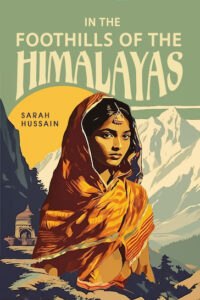HENRY, London
Yes, the novel was inspired by my PhD research. I came across the amazing hill women of the Himalayas who protested to protect the trees. Having come across so many stereotypical depictions of South Asian women, I knew the best way to challenge such negative representations was to write a novel and pay homage to these unsung female activists. I was inspired by their non-violent activism and new I had to tell this story.
IH, Birmingham
I am inspired by nature. Going for walks alone helps my writing come alive. Before writing the trek section of my novel, I would go on regular walks in the woods, using my phone to record my thoughts; I would make note of the small details in relation to sight, scent and sound.
YF, London
No. I knew I wanted to write about British/Indian connections from a postcolonial perspective, but I was inspired to write Vidhya’s story when I learnt about environmental colonialism and the hill women’s contribution to India’s independent struggle.
EB, London
Yes, it was difficult. Initially I was so engrossed in my research that I had to be really careful not to just info drop. I had to remind myself that this was a story that required me to draw on the real life lived experience of the indigenous people. There are already academic books written about the colonial period in India, but I struggled to find fiction written about the British Raj era from the native Indian’s woman’s perspective. My intention was to try and create a plausible setting that would paint a picture of the real-world Vidhya lived in, so this meant focusing on her experience within the socio-economic, political and environmental context.
GEMMA, Christchurch, Dorset
I know it’s a different century, but as a South Asian woman, I understand what it means to grow up within that culture. My South Asian heritage means a great deal to me. Although I am British born, I hold on firmly to my ancestral values, thus I felt creating Vidhya was a very natural process. It might sound unusual, but once her character was born, I felt as though she guided me, more than her being my creation.
DARLENE, Brighton
My PhD research was about contributing to new knowledge, thus my intention to challenge romanticized depictions of South Asian women was a new contribution to English fiction within the British Raj era. I think the way to be unique is to write a story that challenges what people think they know about a historical period. In terms of style, I believe each writer develops their own voice that has its own unique style. I have often been advised to take inspiration from other great writers which is good advice, but it’s also great to take risks. I myself prefer a plot driven novel and I’m not a fan of purple prose, but a lot of novels I read which were set in that part of the subcontinent were heavy in description. I wondered whether I needed to conform to that style of writing, however it didn’t work for me. I wanted to write a historical novel that made readers want to turn the page and find out what will happen next, as well as learning about a period in history that they never knew about. I hope I have achieved that.
VERONICA, Belfast
I believe every individual has their own voice, so I wouldn’t want to have written any other story that I wasn’t inspired to write myself, but I have certainly enjoyed other fiction. My love for fiction began when I read Alice Walker’s, The Colour Purple. Walker created a plausible setting that took me on an emotional journey and the best books for me are the ones that move you and make you question the world.
BRIANNA, Conway
The novel by far was the most challenging. I discovered this new knowledge and was eager to complete my exegesis, thus writing down my ideas including source support was not that difficult for me, especially since I have taught Academic English skills. However the novel was like building a house from scratch; getting the structure in place, before decorating and adding the final touches. I had to get the plot right within a specific historical time frame, which took some redrafting, whilst ensuring there weren’t any anachronisms. Once I managed to create a plausible plot, then I had to consider writing style and this meant word level editing, which is a lot more strenuous than writing an academic thesis in my opinion. Creating Writing is very technical and writing a historical fiction novel was most certainly a challenge, but I am very proud of taking on that challenge and writing a novel that contributes to new knowledge.

A powerful historical eco-thriller tells the story of a courageous young woman who puts her life at risk to save her native land from destruction.
Born in the Raj era under British rule, Vidhya grows up observing her father fight for a free India. She witnesses catastrophic flooding as a result of deforestation by order of a powerful English company, and begins to understand the importance of preserving the forest. When Vidhya uncovers a conspiracy that puts her in great jeopardy, she courageously leads a group of women on a non-violent protest and they embrace the trees. But at what cost?

DR SARAH HUSSAIN is an accomplished author and educator based in Huddersfield. Her poignant novella Escaped from Syria was a finalist in the prestigious People’s Book Prize Award. In 2018, she triumphed in the Ms Shakespeare competition in Yorkshire, leading to her commission to write a monologue that was performed on International Women’s Day. Additionally, she was shortlisted in a competition organised by The University of Huddersfield, and her impactful short story, You Will Be Free One Day, My Dearest India, is featured in the anthology Trouble, published by Grist.